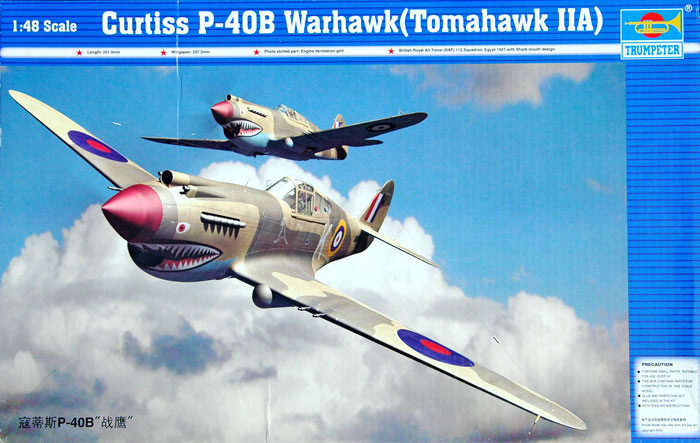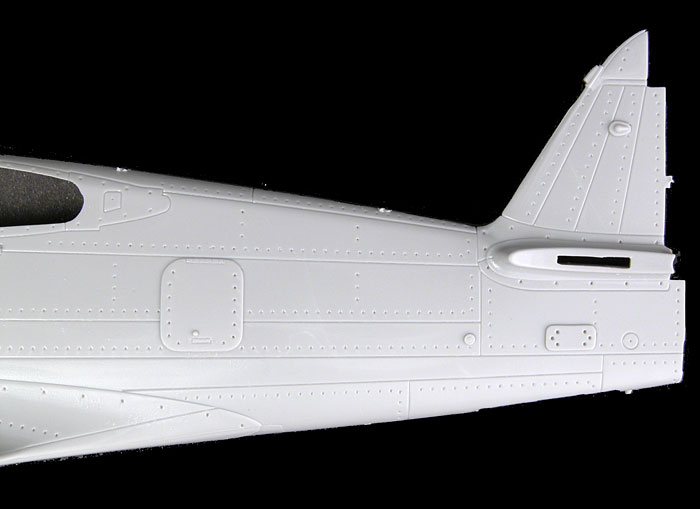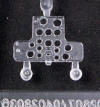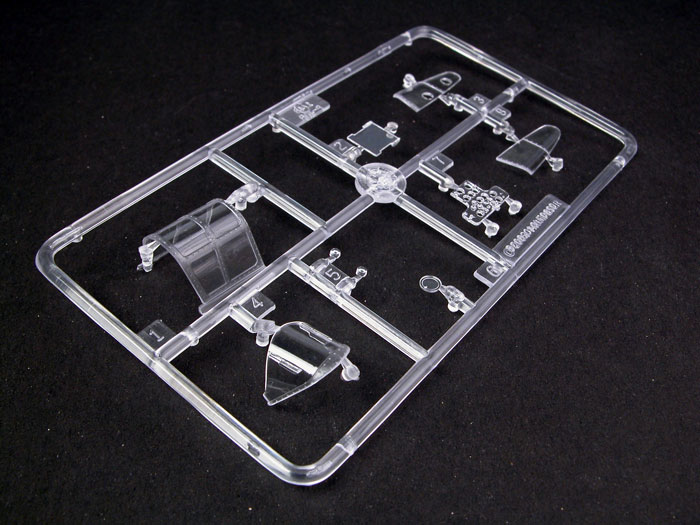|
Curtiss P-40B
Tomahawk Mk.IIA

Trumpeter, 1/48 scale
S u
m m a r y
|
| Catalogue Number: |
02807 |
| Scale: |
1/48 |
| Contents and Media: |
92 parts in light grey injection
moulded plastic, 9 parts in clear, a small photo-etched fret and
markings for two aircraft. |
| Price: |
USD$26.96
from Squadron.com |
| Review Type: |
FirstLook |
| Advantages: |
Accurate outline; good quality mouldings;
separate control surfaces; nice attempt at windscreen (accurately
depicting no external front frames); hollow exhausts; useful
photo-etched parts; nice decals |
| Disadvantages: |
Very shallow cockpit with
correspondingly undersized components; inaccurately raised panels in a
number of areas; recessed rivet lines will not be to everybody's taste |
| Recommendation: |
Recommended. |
Reviewed by Brett Green

Trumpeter's
1/48 scale Curtiss P-40B / Tomahawk Mk.II is available online from Squadron.com
The Curtiss P-40 might not have been the most advanced,
glamorous nor fastest fighter aircraft in 1941, but it admirably bore the
brunt of air battles with the Luftwaffe in North Africa, and the Imperial
Japanese Army Air Force in the Far East, during a critical phase of the
Second World War.
1/48 scale plastic kits of the P-40B/C/Hawk 81 have been
fairly scarce. The Monogram kit, dating from the 1960s, is getting a bit
long in the tooth; while the more recent Hobbycraft kit was a disappointment
due to some serious outline accuracy problems.
Following up on their 1/32 scale release from 2003,
Trumpeter has returned to the fray with their 1/48 scale Curtiss P-40B
(Tomahawk Mk.IIA) kit.
Trumpeter's 1/48 scale P-40B comprises 92 parts in light
grey injection moulded plastic, 9 parts in clear, a small photo-etched fret
and markings for two aircraft packed in a large, sturdy box.
Click the thumbnails below to
view larger images:
Surface detail is by way of recessed panel lines with
parallel lines of recessed rivets. Rivets on plastic models are largely a
matter of personal taste, but to my eye these rivets seem to be too deep and
heavily pronounced. Several panels, including the radio access hatch and
inspection panels on the empennage, are raised. These should be flush with
the surface of the fuselage. It will be a fairly simple matter to scribe
around the raised panels then sand the raised sections flat.

Control surfaces are moulded separately, with fabric
surfaces subtly represented where appropriate. The flaps feature a
photo-etched insert to blank off the fuselage interior - a nice touch.
The photo-etched fret also includes the ring gunsight - a
first for any 1/48 scale P-40 kit. The forward sighting bead and mount is
supplied as a plastic part, but this would be best replaced with fine wire
or stretched sprue for a better scale appearance. Intake grilles are also
supplied in photo-etch.
The cockpit duplicates the problems of Trumpeter's earlier
1/32 scale release, with the entire cockpit being around one-third too
shallow. This means that all the vertical cockpit components are very
noticeably compressed. This is most obvious with the squat seat and short
cockpit sidewalls.
 Trumpeter
has also persisted with its odd instrument panel approach, although this
time no printed instruments are supplied. The instrument panel itself is
moulded in clear plastic, which seems like a good idea until you realise
that the lenses for the dials are actually vacant holes. I would have
thought that the benefit of a clear instrument panel was that the clear
lenses could be masked and the panel painted around them (click the
thumbnail to the right to view larger image). Trumpeter
has also persisted with its odd instrument panel approach, although this
time no printed instruments are supplied. The instrument panel itself is
moulded in clear plastic, which seems like a good idea until you realise
that the lenses for the dials are actually vacant holes. I would have
thought that the benefit of a clear instrument panel was that the clear
lenses could be masked and the panel painted around them (click the
thumbnail to the right to view larger image).
Canopy parts are thin and free of distortion. The windscreen
of the early P-40 is correctly depicted without external forward frames, and
with separate armoured glass on the inside. The method of attachment for the
armoured glass is not 100% accurate, but it is a clever approach to a tricky
problem that will look convincing when assembled and carefully painted.

Other small details worthy of mention include the depiction
of the canopy rails, and the two-piece exhausts with hollow stacks.
The kit is broken down conventionally, with a full-span
lower wing, separate upper wing halves and an insert for the distinctive
chin intake. Although Trumpeter does not offer machine gun bay detail, the
wing guns are supplied with moulded-on breeches. This means that the guns
have to be installed when the wings are glued together, resulting in the
fine barrels being exposed to potential damage during the bulk of
construction. As an alternative, I would recommend cutting the barrels off
the breeches and gluing them into the wings from the outside when the kit is
nearly finished.
The wheels are provided in four parts each - two tyre halves
plus a part for each side of the wheel hub. Peculiar, but it might make
painting easier!
Compared to photographs and drawings, the overall outline of
the kit looks good - certainly much better than the Hobbycraft kit.
Addressing the Rivets
There are a number of methods available if you decide that
you want to reduce the prominence of the rivets on Trumpeter's P-40.
Roger Fabrocini, in his Construction Feature elsewhere on HyperScale,
scraped along the rivet lines with a curved blade. This achieved two aims -
to tone down the rivets and also to add a stressed-metal effect to the
surface of the model.
A less adventurous approach might be to apply a filler to
the lines of rivets. Gunze Mr Surfacer would be ideal for this task, as it
can be brushed directly over the rivet lines. If you want to eliminate the
rivets completely, you might try using putty or Liquid Paper. You will need
to thoroughly sand and polish the model when the filler has dried. Sanding
should also sharpen up the edges of the panel lines.
It might also be advisable to mask panel lines with thin
strips of tape before filling the rivets to avoid accidentally obliterating
all surface detail.
Trumpeter's 1/48 scale P-40B / Tomahawk Mk.IIA has some very
nice features including separate control surfaces, high quality clear parts
and photo-etched details.
Its biggest problem, the short cockpit, can be addressed
with a resin replacement. Several 1/48 scale P-40B resin cockpits have been
released over the years, most of which may be adapted to the new Trumpeter
kit. Cutting Edge has also just released a resin cockpit specifically for
the Trumpter P-40B. The more ambitious modeller might want to scratch build
new sidewalls and bulkheads, modify the rudder pedals and control column,
and use an Ultracast or CE seat to fix the problem.
On the other hand, there will be modellers who are perfectly
happy with the cockpit as it is.
Similarly, modellers will make up their own minds about
whether they want to tone down rivet detail.
Trumpeter's 1/48 scale P-40B / Tomahawk Mk.IIA is a
competent kit of an important WWII fighter.
Recommended.
Kits purchased with the reviewer's funds
Text and
Images Copyright © 2004 by
Brett Green
Page Created 15 December, 2004
Last updated
15 December, 2004
Back to
HyperScale Main Page
Back to
Reviews Page
|
Home | What's
New | Features
| Gallery |
Reviews | Reference
| Forum
| Search